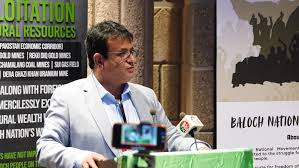
Berlin: Chairman of the Baloch National Movement (BNM), Dr. Naseem Baloch, emphasized that unwavering commitment to principled positions is the true power behind any national struggle. Speaking at a training session for party workers, he stated that national movements cannot succeed through mere slogans or emotional reactions; rather, they require political maturity and strategic presence in political and diplomatic arenas.
The online session, titled “Changing Global Dynamics and Balochistan,” was organized by BNM’s Department of Education and Capacity Building and hosted by the BNM Germany chapter. The aim of the session was to enhance the political, ideological, and practical training of BNM workers and to analyze current global and regional developments.
Dr. Naseem Baloch stressed that a successful national movement must evolve intellectually and practically, preparing its leadership and cadre in line with the changing global landscape. He asserted that seriousness, consistency and resilience are essential for making a meaningful impact on both regional and international fronts.
Referencing recent international conflicts, including tensions between Israel and Iran, and disputes between India and Pakistan Dr. Baloch warned that such issues have implications even for Balochistan. He noted that only thorough preparedness can ensure success in such complex environments.
He criticized the role of the United States, arguing that global politics are driven by interests rather than moral values. He pointed to how Pakistan’s military leadership was invited to the U.S. during the Iran-Israel conflict to align with Western interests, highlighting Pakistan’s function as a proxy state in the region. He also discussed Middle East tensions in detail, and examined the ongoing Russia-Ukraine war, describing it as an emerging crisis for Europe. Dr. Baloch cited examples of certain European countries preparing bunkers to protect civilians indicating growing fears of escalation.
He urged Baloch political workers and leaders to thoroughly study global and regional developments and to sharpen their political insight, which he described as the foundation for effective decision-making.
Appreciating the efforts of party members, especially those abroad, Dr. Baloch acknowledged the recent diplomatic progress made by BNM. However, he cautioned against equating meetings with European institutions or mentions at global forums as signs of success. “True success,” he argued, “will come when international institutions, the European Union, and global media recognize the Baloch issue in the context of genocide and extend political and humanitarian support.”
He stressed that this recognition can only be achieved through organized, consistent, and strategic political and diplomatic efforts.
Citing examples from international politics, Dr. Baloch noted how the U.S. once labeled certain groups in Syria as terrorists, only to later hand control to the same groups. He referenced how the Kurds were supported militarily by the U.S. against ISIS, but were later abandoned. Likewise, former foes—the Afghan Mujahideen and Russia—are now recognized by the same global powers that once opposed them. “States build relationships based on interests, not principles,” he said.
In closing, Dr. Naseem Baloch urged the Baloch nation to define its own national interests and strategies to continue its struggle for freedom, identity, and basic rights effectively. He emphasized that the world only recognizes a nation when it proves itself through serious, organized, and practical action. “Consistent political and intellectual struggle is the only way to gain global attention,” he concluded, calling on party members to ground their efforts in sound political principles.

